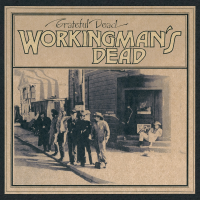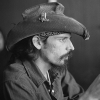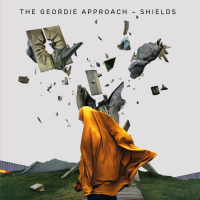Home » Jazz Articles » Album Review » Grateful Dead: Workingman's Dead - 50th Anniversary Deluxe Edition
Grateful Dead: Workingman's Dead - 50th Anniversary Deluxe Edition
At the time of its original issue, the record was—as it still is, to startling effect—unlike any other entry in their discography. In the wake of a bust in New Orleans, with their business organization struggling and in debt to their Warner Bros. Record label, the band was also confronting seismic cultural changes that caused profound alterations in the music they were creating: the new-found emphasis on folk and country styles outweighed that concentration on the blues during their early days as well as the more freewheeling psychedelic improvisation that followed. Yet even today, this bittersweet collection of original songs, just over a half-hour in duration, recorded within a single month in the same year it came out, remains a testament to creativity as a refuge from chaos and bad fortune.
Inclusive from the very first tune, "Uncle John's Band," the Dead offers music as a source of community. Adorned with the most mellifluous vocal harmonizing the group had committed to record at the time (including bassist Phil Lesh's alto voice), its predominantly acoustic textures also presented a marked departure from the electrified configurations of, for instance, Aoxomoxoa (Warner Bros., 1969). Upbeat as is this opener, however, "High Time" belies its title, its mournful air effectively balancing the gaiety and optimism of other Jerry Garcia/Robert Hunter compositions that follow; heretofore somewhat on the periphery of the close-knit Grateful Dead aggregation, the latter lyricist was now, for all intents and purposes, a full-fledged member of the band.
The sprightly "Cumberland Blues" offers another bright spot in the sonic picture this iconic band is painting here, even as it posits a cumulative intensity of performance that grows almost imperceptibly over the course of the album. For instance, the entire sextet displays an uncanny rhythmic surety during "Easy Wind" as Ron "Pigpen" McKernan's guttural vocal delivery meshes faultlessly with the dual drumwork of Bill Kreutzmann and Mickey Hart. The latter would actually leave the group in 1971 for reasons both professional and personal, at the very time the band was playing a run of shows from which come the two bonus discs in this package.
Such exposition of paradox (if not its resolution) is the brilliance of "New Speedway Boogie." The Grateful Dead sound absolutely prescient here as, just weeks following the Altamont concert of December 1969 (where an attendee was knifed to death during the The Rolling Stones' set), they tried to assimilate the sequence of events behind the debacle/disaster. In so doing, the group foreshadowed the fracture(s) within our fifty states in recent years, divisions neatly encapsulated between its opening and closing lines: 'Please don't dominate the rap, Jack, if you've got nothing new to say......''One way or another, one way or another, this darkness got to give...' It's a stroke of genius in arrangement that Garcia and Bob Weir both wield fairly jagged electric guitars on this number, while Lesh uses his instrument to prod his partners in the rhythm section to play with such emphatic precision.
Yet if Workingman's Dead proves anything, it is that the artistic process can supply stability in the midst of 0tumult (as did the record's even rootsier successor, American Beauty (Warner Bros., 1970) out just five months later). So too works the tale of "Black Peter" in both musicianship and composition: the exquisite vulnerability in Garcia's singing imbues with tenderness Hunter's lines, steeped in bitter ironies that echo over the years. Little wonder that what sounds at first like a casual aside on the final track, "Casey Jones," rings ever so clearly as a cautionary tale by which to abide half a century later: "trouble ahead...trouble behind...and you know that notion just crossed my mind."
In more practical terms, the self-consciously arch closing number here, is indicative of how clean and unfettered was the sound of the Grateful Dead on this LP (now highlighted by the remastering by David Glasser); astute co-production between the band, Bob Matthews and Betty Cantor, provided a burnished sonic realism that accurately captures the multiple textures of the eight performances, not to mention the various emotional undercurrents that gave birth to the material and permeated the performances of these novel additions to the band's canon like "Dire Wolf," featuring titular leader Garcia on pedal steel.
The well-defined structure of the songs subsequently gave more focus to the band's live improvisations. Unlike in later years, where segments of concerts were designated free playing, numbers such as the readily-recognized segue of "China Cat Sunflower">"I Know You Rider" provided openings through which the band, as individuals or a collective, might pursue spontaneous flashes of inspiration, without in any way sacrificing the sanctity of the song. As documented on the complete February 1971 Capitol show included here on discs two and three—a companion piece to which is Three From the Vault (Grateful Dead, 2007)—this milestone set carries an underlying distinction as one of the earliest recordings of the group sans Hart on drums.
And yet even this very format, lauded for its agility by rhythm guitarist/vocalist composer Bob Weir over the years, carries further preeminence in the lore of the Dead: the group is effectively an instrumental quartet, sans the keyboardists that would rotate in and out of prominence within the group in decades to come (as Tom Constanten already had). It's a lean, sparse instrumental mix without precedent and gave rise to the commonly applied 'turn on a dime' description of the period (courtesy Weir), a dynamic further reaffirmed through the inclusion of material such as "Playing in the Band," "Bertha" and "Wharf Rat" that would become integral to the Grateful Dead repertoire and gain widespread fame through the inclusion on the live set titled simply Grateful Dead (Warner Bros., 1971), released later that same year adorned with the famous skull and roses graphic.
That's not to disparage the role of McKernan, but only more accurately pinpoint his contributions to the band dynamic on stage. The vocalist/keyboardist/harpist and founding member of this group gets his due and then some as he fronts the charge through a joyfully ramshackle "Easy Wind," assumes the prominence of lead vocalist on "Next Time You See Me" and "King Bee" (where he also plays a pungent harmonica) and also navigates the ensemble back to their roots as a dance band via "Good Lovin.'" A penultimate seventeen minute rendition of the Young Rascals 1966 hit also features Kreutzmann hammering his way through a solo—in contrast to the peppy snap he employs elsewhere—and one of Garcia's longest guitar sojourns of the evening, the expansive approach only renders more apparent the economy of the closer, "Uncle John's Band" (both of which, like all the preceding tracks, benefitting from from Jeffrey Norman's mix).
Like its 50th Anniversary antecedents, the front of this Workingman's Dead slipcase is adorned with a 3D image of its original cover photo a design that at first glance seems overkill considering the spartan nature of the music it encloses (the annotated sketch of the late Robert Hunter on the back is a nice touch though). Upon further contemplation though, and after reading David Fricke's probing prose, as well chief archivist David Lemieux' 'Producer's Note' essay, the multi- dimensional nature of this package art is but a clear reflection of the ever-changing nature of the Grateful Dead oeuvre represented inside.
Track Listing
CD 1: Original Album Remastered - Uncle John’s Band; High Time; Dire Wolf; New Speedway Boogie; Cumberland Blues; Black Peter; Easy Wind; Casey Jones. CD 2: Capitol Theatre, Port Chester, NY (2/21/71) - Cold Rain And Snow; Me And Bobby McGee; Loser; Easy Wind; Playing In The Band; Bertha; Me And My Uncle; Ripple” (False Start); Ripple; Next Time You See Me; Sugar Magnolia; Greatest Story Ever Told; Johnny B. Goode. CD 3: Capitol Theatre, Port Chester, NY (2/21/71) - China Cat Sunflower>I Know You Rider”>Bird Song; Cumberland Blues; I’m A King Bee; Beat It On Down The Line; Wharf Rat; Truckin’; Casey Jones; Good Lovin’; Uncle John’s Band.
Personnel
Grateful Dead
band / ensemble / orchestraJerry Garcia
guitar, electricBob Weir
guitar and vocalsPigpen
vocalsPhil Lesh
bass, electricBill Kreutzmann
drumsMickey Hart
drumsDavid Nelson
guitar, electricAdditional Instrumentation
Jerry Garcia: pedal steel guitar, vocals; Bob Weir: vocals; Pigpen (Ron McKernan): keyboards, harmonica.
Album information
Title: Workingman's Dead - 50th Anniversary Deluxe Edition | Year Released: 2020 | Record Label: Rhino
Tags
About Grateful Dead
Instrument: Band / ensemble / orchestra
PREVIOUS / NEXT
Support All About Jazz
 All About Jazz has been a pillar of jazz since 1995, championing it as an art form and, more importantly, supporting the musicians who make it. Our enduring commitment has made "AAJ" one of the most culturally important websites of its kind, read by hundreds of thousands of fans, musicians and industry figures every month.
All About Jazz has been a pillar of jazz since 1995, championing it as an art form and, more importantly, supporting the musicians who make it. Our enduring commitment has made "AAJ" one of the most culturally important websites of its kind, read by hundreds of thousands of fans, musicians and industry figures every month.




























